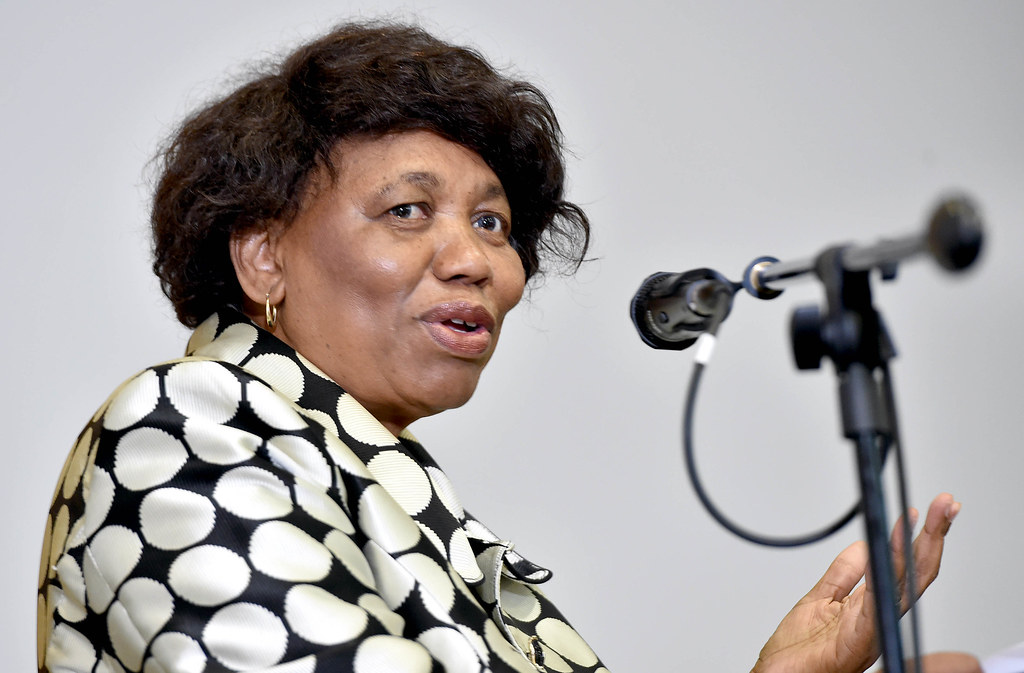CHARLES MOLELE AND NYAKALLO TEFU
BASIC EDUCATION Minister Angie Motshekga has defended her Department’s hotly-contested decision to re-open schools in June, arguing that she followed rigorous research, scientific data and international best practice, including specific guidelines from the World Health Organization, UNESCO and UNICEF.
Addressing the media on Tuesday evening, Motshekga shrugged off concerns by hostile teachers’ unions and non-governmental organizations and presented her controversial plan to re-open schools after their sudden closures in March due to the coronavirus pandemic.
Motshekga, who was flanked by department officials including Deputy Minister Reginah Mhaule and Director-General Mathanzima Mweli, said her advice for children to return to school came from the three international bodies, who say that being out of school increased the risk of teenage pregnancies, sexual exploitation, child marriages, violence and other social maladies.
WHO, UNESCO and UNICEF also states in their guidelines that countries can only re-open schools if it was safe to do so and consistent with overall the country’s COVID-19 health response, with all reasonable measures taken to protect students, staff, teachers and their families.
“The bottom line is that schools are good for children. Schools give children structure and support. They can learn, see their friends, get free school meals and allow their parents to work and provide for them,” she said at media briefing.
Motshekga added that Cabinet and the National Coronavirus Council, chaired by President Cyril Ramaphosa, approved her plans to reopen schools on June 1st for Grade 7s and Grade 12s.
The minister said she also consulted widely and met with teacher unions and school governing associations (SGBs) together with the principals association to update them on her plans to re-open schools.
Motshekga argued that the longer marginalized children were out of school, the less likely they were to return.
“It is for this reason why the Department of Basic Education says it is necessary to re-open schools as soon as possible,” she said.
To state her case, Motshekga imputed UNICEF’s ‘framework for re-opening of schools’, which was compiled after global closures of schools in response to the COVID-19 pandemic: “Children from the poorest households are already almost five times more likely to be out of primary school than those from the richest. Being out of school also increases the risk of teenage pregnancy, sexual exploitation, child marriage, violence and other threats … These negative impacts will be significantly higher for marginalized children, such as those living in countries affected by conflict and other protracted crises, migrants, the forcibly displaced, minorities, children living with disabilities, and children in institutions.”
In recent weeks, Motshekga has been at loggerheads with teachers’ unions and NGOs in the education sector who exhorted her to delay the re-opening of schools under the current conditions, saying her decision was like sending children, school management teams and teachers to a ‘slaughterhouse’.
The unions and NGOs said it was unacceptable for the minister and Government to order re-opening of schools while many lacked water and sanitation, proper toilets, sanitizers, disinfectants and masks, among other non-negotiables.
The unions and NGOs also criticized Motshekga war for failing to provide mobile toilets to schools to in order to replace pit latrines.
Section 27, Equal Education and the Equal Education Law Centre maintained on Tuesday evening that Motshekga has failed to fix South African schools for many years, adding there are still 3 700 schools with pit latrines as their only form of sanitation.
While Motshekga conceded to the slow provisioning of water and sanitation infrastructure to rural and urban public schools, she maintained that the delivery of the COVID-19 essentials such as sanitizers, masks, water and sanitation was being done ahead of the phased reopening of schools from June 1st.
As a matter of fact, she added, all food handlers at public schools would be supplied with the required personal protective equipment (PPEs).
These includes gloves, aprons and cloth mask.
She said her department has entered into an Implementation Protocol agreement with the Department of Human Settlements, Water and Sanitation and the Rand Water to provide water at various schools across the nine provinces.
Motshekga also added that Basic Education was working with Department of Transport to ensure that safety protocols were maintained.
“Everyone will have to sanitize their hands on entering a bus or any scholar transport and manage distance between learners in the bus, including compulsory wearing of masks throughout the school day.
Earlier, Motshekga urged parents to work closely with schools to ensure that learners with pre-existing illnesses are assisted.
She said schools will work with parents to obtain the information which once again needs to be treated with the utmost care.
Motshekga said concerned parents should feel free to declare any underlying health issues that their children had in order to ensure that no one was at risk when they go back to school.
“Learners will be screened daily when they enter the school premises”, said Motshekga.
She said children from special schools were also to be prioritized.
“I want to emphasize that every child is important, and we have to deal with every child case by case when they return to school,” said Motshekga.
Parents worried about the risk of contamination can continue to home-school their children, she said.
Motshekga said parents had the right to keep their children at home but they should not deny them the right to education.
“SASSA allows children to be home-schooled, so parents can apply and register for your child because the law says every child has the right to education”, said Motshekga.
Last week, SMTs were set to return to schools, followed by teachers, but teachers’ unions advised their members not to return because the department did not meet their non-negotiables of providing Personal Protective Equipment (PPE).
(Compiled Inside Politics staff)



